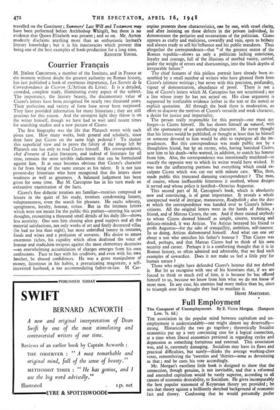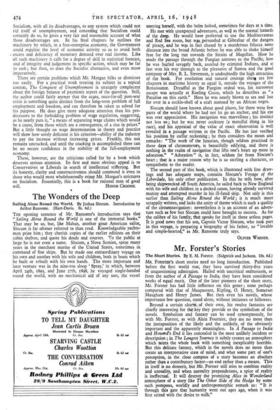Full Employment
THE association in the popular mind between capitalism and un- employment is understandably—one might almost •say deservedly— strong. Historically the two go together ; theoretically Socialist economics put up a very convincing case for a logical connection, at a time when liberal economics persisted in regarding cycles and depression as something fortuitous and external. This association was, and is, extremely damaging. Socialism may have its flaws and practical difficulties, but surely—thinks the average working-class voter, remembering the 'twenties and 'thirties—none as devastating as that ; and he casts his vote accordingly.
Mr. Morgan's excellent little book is designed to show that the connection, though genuine, is not inevitable, and that a reformed and amended capitalism would be vastly superior, according to all canons of economic desirability, to Socialism. He gives incomparably the best popular statement of Keynesian theory yet provided ; he sets that theory against a brilliantly sketched background of economic fact and theory. Confessing that he would personally prefer Socialism, with all its disadvantages, to any system which could not rid itself of unemployment, and conceding' that Socialism could certainly do so, he gives a very fair and reasonable account of what those disadvantages are. In his final chapters he outlines the machinery by which, in a free-enterprise ,conomy, the Government could regulate the level of economic activity so as to avoid both excess and deficiency of monetary demand over real income. Like all such machinery it calls for a degree of skill in statistical forecast, and of integrity and judgement in specific -action, which may be far to seek ; but then, so does the Socialist alternative, and even• more imperatively.
There are certain problems which Mr. Morgan bilks or dismisses too easily. For a practical work treating its subject in a topical context, The Conquest of Unemployment is strangely complacent about the foreign balance of payments aspect of the question. Still, the author could fairly answer that the acute, once-for-all post-war crisis is something quite distinct from the long-term problem of full employment and freedom, and can therefore be taken as solved for his purpose. He does give more adequate attention than his pre- decessors to the forbidding problem of wage regulation, suggesting, as he neatly puts it, " a means of separating wage claims which would be a cause, from those which are a consequence, of a rise in prices." But a little thought on wage determination in theory and practice will show how sorely deficient is his criterion—ability of the industry to pay the increase without increasing prices. Frankly, this nut remains uncracked, and until the cracking is accomplished there can be no secure confidence in the stability of the full-employment economy.
These, however, are the criticisms called for by a book which deserves serious attention. Its first and most obvious appeal is to Conservatives or Liberals in search of intellectual stiffening. But its honesty, clarity and constructiveness should commend it even to those who would most wholeheartedly rejeet Mr. Morgan's strictures on Socialism. Essentially, this is a book for rational men of good































 Previous page
Previous page